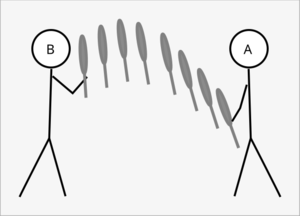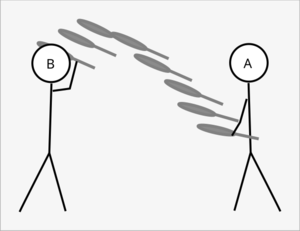Throwing first Zaps
Zaps are fast throws in which the club only does a half turn or flies flat. They are like a normal pass caught by someone standing in the middle between two passers doing normal passes - before the club really turned or gained much height.
We start out with a slightly slower version, one could also call them "candlestick throws" to make the first patterns easier to learn. It is usually not very hard to make faster throws lateron if needed or wanted.
Stand relatively close together. The more distance your throws have to go, the more they will turn without intent.



Ways to make the throw:
- hold the club upright and relatively close to the middle and then throw the club by giving it a lift and a push forward.
- hold the club horizontally and throw it a little bit like a flat (a horizontal no spin throw juggling alone)
Consider the pictures to the right - I would consider all of these ok. The last one actually lets B catch a horizontal club - this only works if your club gains enough height so it is above the shoulder of B.
Important is that you start the throw with your hand lowered and do the throw upwards. If your motion is fully horizontal, the throw will be much faster and this will make everything much more stressful. Some people even start throwing zaps a little bit downwards, that becomes extremely hard to catch and must be avoided.
Start practicing that with your partner. Practice until the throw works ok for you from both hands. Practice straight and also diagonal throws - one partner will have to do only straight throws in the following patterns, the other only diagonal throws.
Time needed: When I practice this with someone, it takes maybe about 5-15 minutes with my corrections until we can move on. If this throw is new for both partners, it may be better to give it more time. Specially as both will probably not be able to correct mistakes to the same degree as someone more experienced.
Continue practicing this, if you still see the tedency for the club to turn too much. The throws in this exercise need to be better than what is actually needed in the first pattern, because your attention will be on learning the sequence of throws and you cannot give the throw itself your full attention anymore. Come back to this simple throwing exercise for a couple of minutes whenever you notice that your throws become much worse.
Next patterns to try: